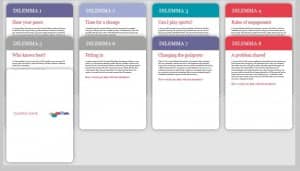The early teen or “tween” and teenage years can be a challenging time for any young person. When hearing loss is added to the mix, teens and tweens with hearing loss face unique circumstances that require an additional level of caring and expertise from the hearing care professionals they encounter on their journey. To address this issue, Ida Institute, Naerum, Denmark, has introduced the Teen and Tweens Dilemma Game, a new version of the popular Dilemma Game tool that is designed to better prepare hearing healthcare professionals to deal with clinical situations when treating teenage patients.

The new tool consists of a series of dilemma cards that describe challenging scenarios involving teens or tweens with hearing loss. Three possible solutions are given, with the understanding that the ‘perfect’ solution may not exist. With no right or wrong answers, game play encourages reflection, critical thinking, and analysis of the potential consequences that a professional’s choices may have on a patient and a variety of stakeholders.
“The Teens and Tweens Dilemma Game is one of several Ida tools that can be used for self-development, either in team training or as an individual exercise,” explains Bundesen. “By helping hearing care professionals to examine various aspects of the teenage experience and consider those situations from the patient’s perspective, we aim to deepen understanding and motivate more patient-centered interaction that benefits both teens and hearing care professionals.”
The Teens and Tweens Dilemma Game was developed in collaboration with Ida Network members Joy Rosenberg, Joni Johnson, Hannah Williams, and Debbie Baerlocher.
Source: Ida Institute




